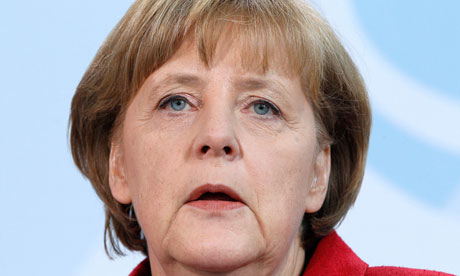Siobhan Dowling guardian.co.uk, Thursday 17 May 2012 17.36 BST
Angela Merkel, under pressure to ease her austerity fixation, has said she is open to stimulus measures to help Greeks
Angela Merkel told CNBC she had 'the will and the determination to keep Greece in the eurozone'. Photograph: Michael Sohn/AP
In the buzzing bars and cafes of Berlin, you would hardly know that the rest of the Europe is embroiled in a crisis that threatens to spiral out of control.
Most talk in the Mitte or Kreuzberg districts this week has been about the debacle of Berlin's new airport not opening on time and a pitch invasion by Düsseldorf football fans on the night the local team Hertha were relegated. On the comment pages and political programmes, most of the chatter is about Angela Merkel's decision to fire her one-time protege and environment minister, Norbert Röttgen.
On the surface it looks as if Germans haven't had it so good in decades, allowing them to engage in navel-gazing while the rest of Europe struggles to cope with mounting debts and the challenges of Berlin-dictated austerity. When the woes of countries such as Greece do come up, it is often framed in terms of lazy southerners who don't work as hard as the Germans, and frustration at having to bail them out.
Yet the tone from the political elite in Berlin has softened somewhat in recent days as concerns mount about the prospect of Greece being pushed out of the eurozone. In a series of interviews, Merkel said she was open to some sort of stimulus measures to help the Greeks. "Europe needs to show solidarity and help particularly with growth, unemployment and development," she told CNN. And in an interview with CNBC, she said: "I have the will and the determination to keep Greece in the eurozone."
Her words were in contrast to recent tough comments from German officials who insist that if Greece were to exit the eurozone then enough of a firewall had been built to prevent contagion. While Merkel may be holding out the prospect of some sort of growth measures for Greece, her government is insisting that the Greeks stick to the terms of the deal agreed with the troika – the European Union, European Central Bank and International Monetary Fund – that allowed Athens to secure a €130bn lifeline in March and avoid default.
Merkel's finance minister, Wolfgang Schäuble, has said there can be no renegotiation of the deal. "There is no comfortable way to solve Greece's problems," he told Deutschlandfunk radio. "If Greece wants to remain in the eurozone – and we all want that – then that is the path that can help Greece," he said, referring to the programme of reforms and cuts to which Athens signed up.
The foreign minister, Guido Westerwelle, called on the Greek people to make a clear decision about their country's future when they go to the polls against next month. "The Greek people should know what they are voting about – it's not about party politics, but about Greece's future in Europe and the euro," Westerwelle said.
There has been deep frustration in Germany at the Greeks' failure to implement the reforms it had signed up to when it received its previous bailout in 2010. Politicians in Berlin are aware that the bailouts are incredibly unpopular among German voters, who see it as throwing good money after bad.
Many Germans feel that they went through their own austerity in the form of tough labour and welfare reforms implemented at the beginning of the last decade. As such, the tough line from Merkel has gone down well with German voters. A poll for Stern magazine last week showed that 61% approved of her firm handling of the euro crisis, and 59% said that any measures to boost growth should not involve taking on more debt.
However, there are also growing calls – particularly from the opposition Social Democrats – for Merkel to ease her austerity fixation. The party is emboldened by its victory over Merkel's conservative Christian Democrats in a regional vote in North Rhine-Westphalia on Sunday. The CDU sought to make an issue of the SPD-led state government's decision to take on more debt, but the strategy backfired badly.
The SPD has for the most part backed Merkel's euro policies, but it is now calling for more growth measures to complement the strict budget discipline as laid down in the fiscal compact. Merkel needs a two-thirds majority in the Bundestag to ratify the pact, and so is dependent on the SPD. This week the party said it would delay a vote scheduled for 25 May, and would only back it if it included measures for stimulating growth.
"We don't dispute the need for consolidation in Europe, but we dispute how this consolidation should be achieved," said Frank-Walter Steinmeier, the SPD floor leader in the Bundestag. "Growth must not collapse in the crisis, and the German government is ignoring this."
German stance on Greek crisis softens as eurozone fears mount | World news | The Guardian
